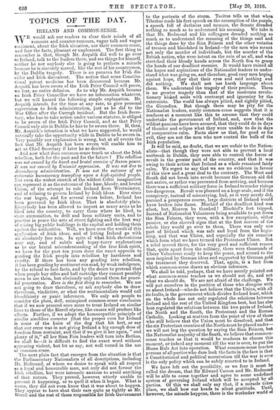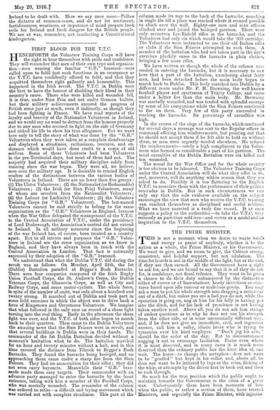TOPICS OF THE DAY.
IRELAND AND COMMON-SENSE.
yall iT E would ask our readers to clear their minds of a V rumours and counter-rumours, vague talk and vague sentiment, about the Irish situation, use their common-sense, and face the facts, pleasant or unpleasant. The first thing to remember is that, though Mr. Asquith did well to go over to Ireland, talk to the leaders there, and see things for himself, neither he nor anybody else is going to perform a miracle because he is sincerely moved, like the rest of his countrymen, by the Dublin tragedy. There is no panacea for Irish dis- order and Irish discontent. The notion that some Constitu- tional patent medicine has been discovered because Mr. Asquith has been sworn of the Irish Privy Council will prove, we fear, an entire delusion. As to why Mr. Asquith became an Irish Privy Councillor we have no information whatever, but we will hazard the following simple explanation. Mr. Asquith intends, for the time at any rate, to give personal supervision to Irish administration, just as he did to the War Office after the Curragh incident. But the Irish Secre- tary, who has to take action under various statutes, is obliged to be sworn of the Irish Privy Council, and as that Privy Council only sits in Dublin he has to be sworn there. If, then, Mr. Asquith's intention is what we have suggested, he would naturally take the opportunity while in Dublin to be sworn in. Very possibly our explanation is wrong, but at all events the fact that Mr. Asquith has been sworn will enable him to act as Chief Secretary if later he so desires.
And now what does common-sense teach us about the Irish rebellion, both for the past and for the future ? The rebellion was not caused by the harsh and brutal exercise of Saxon power. It was not caused by Unionist oppression. It was not due to Ascendancy administration. It was not the outcome of an autocratic bureaucracy trampling upon a high-spirited people. Not even the widest stretch of the wildest Celtic imagination can represent it as the outcome of the base, bloody, and brutal Union, of the attempt to rule Ireland from Westminster, and of refusing to govern Ireland by Irish ideas. Ever since the war began, and for several years before, Ireland has been governed by Irish ideas. That is absolutely plain. Everybody has been allowed to import as many arms as he liked into the country, to carry them where he liked, to store ammunition, to drill and form military units, and to practise in peace the arts of street fighting and the best way of seizing big public buildings in the capital and holding them aaainst the authorities. Well, we have seen the result of this application of Irish ideas, and of letting Ireland go with an absolutely free rein. In spite of what Irish rhetoricians may say, and of subtle and topsy-turvy explanations as to our brutal misunderstanding of the true Irish spirit, we have for the past ten years done the exact opposite to goading the Irish people into rebellion by harshness and cruelty. If there has been any goading into rebellion, it has been goading by sentiment run mad, by weak indulgence, by the refusal to face facts, and by the desire to pretend that when people buy rifles and ball cartridge they cannot possibly mean to use them, but obviously only intend them for peace- ful penetration. Here is the first thing to remember. We are not going to draw therefrom, or ask anybody else to draw therefrom, vindictive, or what the sentimentalists would call bloodthirsty or panic inferences. We only ask people to consider the plain, dull, uninspired common-sense conclusion that if we now proceed once more to treat Ireland on similar lines to those of the Birrell regime, like causes will produce like effects. Further, if we adopt the homoeopathic principle of similia similibus curantur (that the proper cure for Ireland is some of the hairs of the dog that bit her), or say that our error was in not giving Ireland a big enough dose of freedom from restraint, and that if we give it her again, " and plenty of it," all her Sinn Fein leaders will turn into Bothas, we shall be—it is difficult to find the exact word without appearing violent, but let us say, not well versed in the use of common-sense.
The next plain fact that emerges from the situation is that the Parliamentary Nationalists of all descriptions, including Mr. Redmond, of whom we desire to speak with all respect as a loyal and honourable man, not only did not favour the Irish rebellion, but were intensely anxious to avoid anything of that nature. They proved, however, utterly unable to prevent it happening, or to quell it when it began. What is worse, they did not even know that it was about to happen. They appear to have shut their ears quite as tightly as Mr. Birrell and the rest of those responsible for Irish Government to the portents of the storm. Tacitus tells us that when Tiberius made his first speech on the assumption of the purple, a speech full of darkness and menace, the Senate dreaded nothing so much as to understand his meaning. We take it that Mr. Redmond and his colleagues dreaded nothing so much as to understand the meaning of the things said and the things done by the Sinn Feiners and the other votaries of treason and bloodshed in Ireland—by the men who meant not only the murder of individuals, but the murder of the British nation, who were intent on the ruin of us all, and who stretched their bloody hands across the North Sea to grasp the hands of our deadliest enemies. It would have ruined all the hopes and aspirations of the Nationalist leaders to under- stand what was going on, and therefore, good easy men hoping against hope, they shut their eyes and said nothing and did nothing. We shall not use harsh language about them. We understand the tragedy of their position. There is no greater tragedy than that of the moderate revolu- tionary kicked aside with contempt and ignominy by the extremists. The world has always pitied, and rightly pitied, the Girondins. But though there may be pity for the Nationalist leaders, surely common-sense suggests that it is madness at a moment like this to assume that they could undertake the government of Ireland, and, now that the wildest passions have been aroused, that they could do in days of thunder and eclipse what they were unable to do in days of comparative calm. Facts show us that, for good or for evil, they are not the men who now control the bulk of the Irish population.
It will be said, no doubt, that we are unfair to the Nation- alists—that though they were not able to prevent a local outbreak in Dublin, they were able to control the forces of revolt in the greater part of the country, and that it was owing to their action that Ireland as a whole remained fairly calm. We regret to say that we see no evidence in favour of this view and a great deal to the contrary. The West and South did not break into revolt because the German aid did not arrive, or rather was prevented from arriving, and because there was a sufficient military force in Ireland to render risings too dangerous. Revolt was planned on a huge scale, and if the conspiracy, instead of miscarrying, had, as it very nearly did, pursued a prosperous course, large districts of Ireland would have broken into flame. Mischief of the deadliest kind was afoot, but, Heaven be thanked I Mischief's feet tripped.
Instead of Nationalist Volunteers being available to put down the Sinn Feiners, they were, with a few exceptions, either passive, or else showed signs that at the first success of the rebels they would go over to them. There was only one part of Ireland which was safe and loyal from the begin- ning, and that was Ulster, and especially the six counties which form what we have termed the Protestant Ulster. Not a rebel moved there, for the very good and sufficient reason that, quite apart from the military, there were thousands of Ulster Volunteers ready to keep the peace, and accord to the men inspired by German ideas and supported by German gold the treatment they deserved. That, again, is a fact from which common-sense draws an obvious inference.
We shall be told, perhaps, that we have merely pointed out what common-sense teaches us we should not do, and not what we should do. We are not afraid of the challenge. We will put ourselves in the position of those who disagree with us about Ireland—who do not believe that the Union, with all its faults, is the government which divides Ireland least, which on the whole has not only regulated the relations between Ireland and the rest of the United Kingdom best, but has also best regulated the relations between the two parts of Ireland, the North and the South, the Protestant and the Roman Catholic. Looking at matters from the point of view of those who still believe that the Union must be dissolved, and that the six Protestant counties of the North must be placed under— we will not beg the question by saying the Sinn Feiners, but the Nationalist majority of the South, we believe that common- sense teaches us that it would be madness to choose this moment, or indeed any moment till the war is over, to put the Home Rule Act into operation. What common-sense teaches persons of all parties who dare look the facts in the face is that a Constitutional and political moratorium till the war is over is the only policy which can be safely resorted to in Ireland. We have left out the possibility, or we fear it must be called the dream, that Sir Edward Carson and Mr. Redmond will be able to come together and agree to some undefined system of governing Ireland which will be accepted by all parties. Of this we shall only say that, if a miracle takes place, we shall bow our heads in silent gratitude. Until, loweyer, the miracle happens, there is the workaday world of Ireland to be dealt with. Here we say once more—Follow the dictates of common-sense, and do not let sentiment, fastidiousness, weariness, or impotence of mind prepare fresh evils for Ireland and fresh dangers for the British people. We are at war, remember, not conducting a Constitutional kindergarten.































 Previous page
Previous page